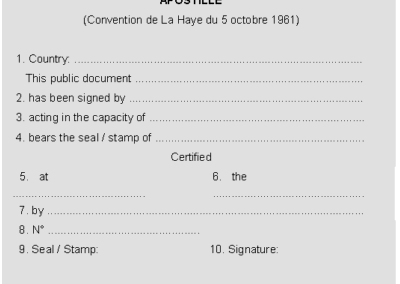The Hague Apostille in sworn translations
The Hague Apostille is an official document that certifies the signature and title of the person, usually a civil servant or Notary, who signs a document. Apostilles must be recognized and accepted by the signatory countries of the agreement of the same name.
If you request a sworn translation from Spanish into a foreign language such as English or German, you must first ask if an Apostille will be required.
In these cases, the procedure is as follows:
- First of all, you will have to ask us for a sworn translation quote, sending us a scanned copy of the original document.
- Once the estimate has been approved and the translation has been completed, you must collect the translated document and go to the Notary Public who will be instructed to authenticate the translator’s signature.
- Subsequently, the translation legalised by the Notary is sent to the Association of Notaries to process the Hague Apostille. The deadlines are usually between two and three days and it is a procedure that you can carry out yourself or through a Notary.
The Apostille is a page that is attached either at the beginning or end of the document, and is stapled and sealed so that it cannot be used fraudulently for another document. Other times it is a large sticker or seal that is attached to the back of the document and completed by hand. Some American Apostilles include a link to a website where you can verify their authenticity by entering the registration number.
For example, official documents from the United States usually carry an Apostille issued by the Secretary of State certifying the signature of the Notary Public. Academic certificates and records are signed by the Secretary of the University and, in turn, a Notary Public certifies the authenticity of the signature by means of a legalisation that incorporates an official seal. Finally, a senior official issues the Apostille on behalf of the Secretary of State.
You will find more information about Apostilles in Spain on the website of the Ministry of Justice.

